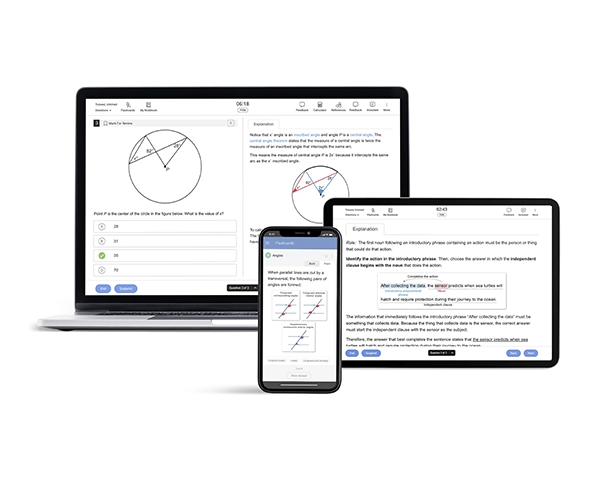SAT® Guide for International Students

The College Board® currently administers the International SAT digitally, effective from 2023. To learn about the key changes in the new test format, check out our page on the Digital SAT.
Is the SAT Important for International students?
Yes! Taking the Digital SAT® can become the highlight of your application when applying to U.S. colleges. Here are a few reasons why the Digital SAT can be a game changer for international students:
To get into competitive four-year US colleges
Submitting Digital SAT scores is a prerequisite or option at many four-year colleges. At test-mandatory schools, your application will not be accepted without including your SAT test scores. At test-optional institutions, a strong score could help your application stand out in a pool of highly qualified domestic and international candidates.
To demonstrate college readiness
The SAT is a strong predictor of college readiness and propensity for college success. A good Digital SAT score can make you a more competitive candidate for your prospective college by showing you are likely to do well in their programs and are likely to graduate.
To balance out GPA
SAT scores are considered a more effective indicator than Grade Point Average to measure student performance and academic capabilities. So, a good Digital SAT score may help improve your chances even if you have a low GPA or come from a secondary school that is unfamiliar to the admissions committee.
Is the SAT Hard for International students?
The difficulty of the SAT generally depends on how you prepare for the test. However, the following reasons may make the SAT considerably harder for international students:
- Command of English Language: As all sections on the Digital SAT require reading passages or understanding word problems, a good command of language structure and syntax is important. For non-native English speakers, understanding tough vocabulary and interpreting data from the given text might be challenging.
- Broad Syllabus: The SAT mainly focuses on topics students learned in high school. However, you might come across some high-level texts and concepts that go beyond your high school knowledge. Thus, preparing for the new concepts may be a tough task.
But, all these difficulties can be overcome if you prepare the right way. Read our guide on How to Study for Digital SAT for tips on studying effectively and making a study plan. In addition, regular practice is the key to understanding your strengths and working on your weaknesses.

SAT International Registration, Fees, and Dates
If you have decided to take the Digital SAT, the next question usually is, “How do international students apply for the SAT?” The answer is simple. You can apply for the test directly through the College Board's official website by following these steps:
- Create your College Board account or use an existing account
- Fill out the application form with all the required details
- Pay the fees and submit your photo ID
SAT international test dates and deadlines
It’s important to keep track of all SAT international test dates and deadlines. Missing a deadline will usually result in late fees or prevent you from taking the exam. Refer to the table below for the upcoming Digital SAT international test dates and deadlines. There is no provision for late registration for international students. Make sure that you keep track of the registration deadlines and register for your SAT test before that.
| SAT International Test Date | Deadline for Registration, Changes, and Cancellation |
|---|---|
| Mar 9, 2024 | February 27, 2024 |
| May 4, 2024 | April 23, 2024 |
| June 1, 2024 | May 21, 2024 |
Possible Test Dates for the SAT – August to December 2024, Cycle:
| Possible Digital SAT Test Date |
|---|
| August 24, 2024 |
| October 5, 2024 |
| November 2, 2024 |
| December 7, 2024 |
SAT international registration and score service fees
The Digital SAT international testing fee is $60 plus a $43 regional fee. Apart from the registration fee, there are a few additional SAT fees you might have to pay for specific services:
| Service | Fee | Details |
|---|---|---|
| Test center fee | $24 | Some test centers charge an additional fee. Check out the list here. |
| Change test center | $25 | To change the international SAT test center. |
| Late registration | $30 | To register after the regular registration deadline. |
| Cancel registration | $25 | To cancel your registration on or before the regular deadline. |
| $35 | To cancel your registration after the regular deadline. |
Note: If you want to change the test date, you need to cancel and register for a new test.
Read how to change your registration information here. The College Board charges some fees for the score related services also:
| Service | Fee | Details |
|---|---|---|
| Additional score reports | $14 per report | The first four score reports are free. Charges may apply if you are ordering additional reports. |
| Rush reports | $31 | Additional charges are applicable. |
| Get scores by phone | $15 per call | Fees need to be paid by credit card at the time of call. |
| Archived scores | $31 | Additional charges are applicable. |
| SAT Question-and-Answer Service | $16 | To know more about these services, read our blog. |
| SAT Student Answer Service | $16 | |
| Hand score verification | $55 |
How to get a Digital SAT fee waiver for international students?
SAT fee waivers may be granted to eligible foreign nationals who reside and take their tests in the United States or its territories. Outside the U.S., only U.S. citizens who are residing in other countries may be eligible for fee waivers.
To receive a fee waiver, you need to meet at least one of the requirements listed below:
- You are registered or qualified for the federal National School Lunch Program (NSLP).
- Your family's annual income comes within the Income Eligibility Guidelines established by the Food and Nutrition Service of the USDA.
- You are registered in a federal, state, or local program that supports children from low-income families.
- Your family receives public assistance.
- You are homeless, or you live in federally funded public housing or a foster care home.
- You are an orphan or a ward of the state.
Digital SAT International Policies and Accommodations
First, before taking your Digital SAT test, read our blog on what to bring on your SAT test day. For a quick review, be sure to take a printed copy of your admission ticket and a photo ID that meets all of the requirements set by the College Board.
Now, let’s review some of the rules and guidelines. Any violation may result in the cancellation of scores and dismissal from the test center. Students are required to acknowledge the following testing policies:
- Asking someone to impersonate you or impersonating someone to take the test is prohibited.
- Using phones, consulting textbooks, electronic devices (except your digital SAT testing device), or discussing questions and answers during and after the test is not allowed.
- Your scores are canceled if you leave the test center before the test ends. Leaving the answer blank may also result in dismissal.
- Adhering to the time duration for each section on the test is important. Skipping or switching between sections is not permitted.
- Sharing calculators is not allowed, so you need to bring your own. Keep the calculator on your desk only while taking the Math Test.
You must note that in addition to the above policies, different policies might apply to different regions of the world. To know the registration policies for your testing location, visit the College Board’s official website.
You also have the provision to request accommodations for your Digital SAT test. Accommodations are special provisions that the College Board provides for students with documented disabilities, allowing them to take the test with some modifications. Students with disabilities like visual impairments and blindness, physical and medical impairments, learning disorders, and motor impairments may raise requests for accommodations. You can reach out to your school’s Students with Disabilities (SSD) coordinator to help you file an accommodation.
For more details about testing policies and the consequences of violating them, digital test device policies, and the types of accommodations available for taking the Digital SAT, read our page on SAT Test Policies and Accommodations.

References
- International SAT Dates and Deadlines – SAT Suite. (n.d.).
https://satsuite.collegeboard.org/sat/registration/international-testing/dates-deadlines - International SAT Testing Policies – SAT Suite | College Board. (n.d.).
https://satsuite.collegeboard.org/sat/registration/international-testing/policies - International Fees – SAT Suite | College Board. (n.d.).
https://satsuite.collegeboard.org/digital/digital-testing/international-fees - Does my test center charge an additional test center fee? – SAT Suite | College Board. (n.d.).
https://satsuite.collegeboard.org/help-center/does-my-test-center-charge-additional-test-center-fee - Canceling an SAT Registration – SAT Suite | College Board. (n.d.).
https://satsuite.collegeboard.org/sat/registration/change-cancel/canceling-registration - International SAT Testing Policies – SAT Suite | College Board. (n.d.).
https://satsuite.collegeboard.org/sat/registration/international-testing/policies
Frequently Answered Questions (FAQs)
What is considered a “good” SAT score for international students?
What SAT score is required for a scholarship in the U.S. for international students?
How can an international student get a full scholarship?
Are foreign-born and international students eligible for SAT fee waivers?
Related Articles
Planning to take the Digital SAT? Read everything you need to know about the test, including the advantages, level of difficulty, topics to focus on, test dates, and more.
Are you interested in knowing how the Digital SAT is structured? This all-in-one guide has everything about the SAT format—the duration of the test and question types.
Have you started your SAT prep yet? Refer to this guide to understand everything about the Digital SAT syllabus, question types, and the weightage of different topics.
Preparing for the Digital SAT but unsure about where to start? This guide provides all the tips and tricks to help you prepare effectively for your SAT to get your target score.